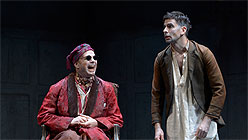As I sit here writing about Samuel Beckett’s Endgame and Play, through June 3, 2012, at the American Conservatory Theater in San Francisco, the moon is obliterating the sun, transforming the usual late-afternoon rays that filter through the trees in our modest backyard into an almost-smoky, definitely eerie, haze. It seems a fitting bit of atmospherics for these gloomy, highly stylized, one-act investigations of death, hopelessness and infidelity.
Up first is Play, which only runs 25 minutes but by design is meant to feel longer. As we meet Annie Purcell, a philandering husband’s mistress, Anthony Fusco as the cad and René Augesen as his wife, they are up to their necks in funeral urns and speaking simultaneously, so their words blur to an unintelligible mush. We will soon hear each player’s side of the story (twice!) when cued by an interrogating spotlight, but for now their explanations, confessions and complaints are literally so much noise.

From left to right, Annie Purcell as W2, Anthony Fusco as M and René Augesen as W1 in Samuel Beckett’s Play. Photo by Kevin Berne.
Give the actors credit for doing a lot with little more than their voices and facial muscles. Bound by the confines of her urn, Augesen manages to convey the plight of a woman scorned, whose case is undermined by her sense victimhood and garden-variety entitlement (she was there first, which automatically makes her adversary a slut). Fusco doesn’t seem to genuinely care for either one of the objects of his alleged affections, but he’s a man who just can’t help himself, uncomfortable, to paraphrase the great Groucho Marx, by being a member of any club that would have him as a member. Purcell is the most animated of the trio, but she, too, is trapped, less by the urn than her desire to triumph over any form of female competition. What’s love got to do with all of this? When it comes to triangles in Beckett-land, not bloody much.
In Play, at least everyone’s getting laid. In Endgame, nothing happens at all. Okay, some people finally die, while the one whose bilious flame you wish would be extinguished more quickly doesn’t. That would be Bill Irwin’s wheelchair-bound and blind, Hamm, an especially insufferable creation, even by Beckett standards. Irwin’s body language is wonderful, as he curls and contorts himself in his makeshift wheelchair, his John Lennon granny glasses hiding his useless eyes, but the voice he gives to this ultimately unsympathetic blowhard (“Can there be misery loftier than mine,” he pronounces early on in the 85-minute play) cracks, rises and falls like a baritone version of Professor Frink on The Simpsons. I was completely sold by his physicality, but I could have done without the shticky lizard-action of his tongue and the vocal shenanigans, which pulled too much focus from Beckett’s words.



